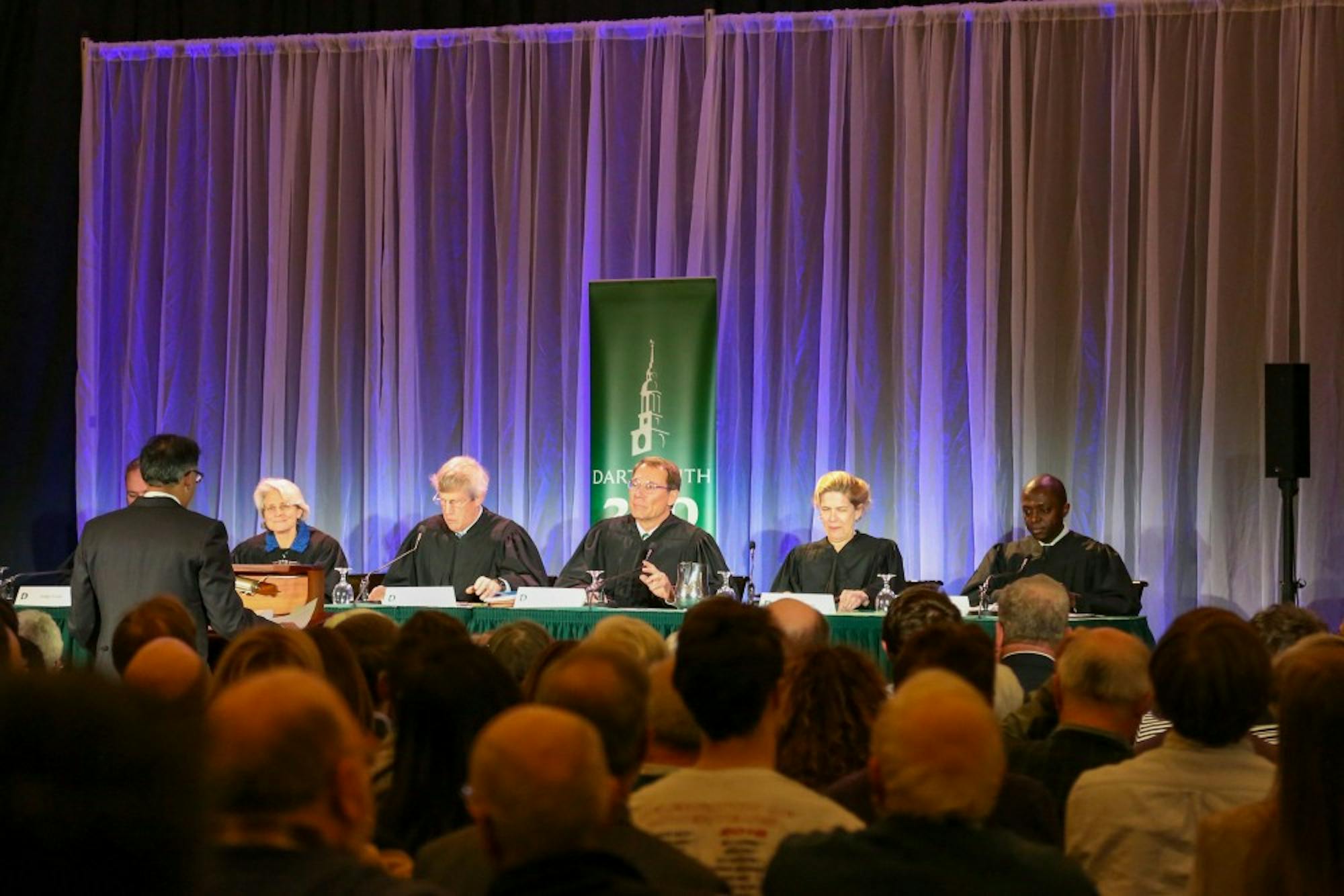History came to life on Friday during the re-argument of Dartmouth College v. Woodward, the landmark 1819 Supreme Court case that preserved Dartmouth’s status as a private college and strengthened constitutional protections against state interference in contracts. Several hundred alumni and community members filled Alumni Hall for the event, which was part of the ongoing celebration of the 250th anniversary of the College’s founding.
The case began after the New Hampshire state government attempted to alter the College’s royal charter granted by King George III, ruler of the 13 American colonies before the Revolutionary War. In 1816, changes were made to the school charter that included establishing a state oversight panel, allowing the governor to appoint trustees and renaming the school Dartmouth University, effectively converting it to a public university.
In response, the College’s trustees filed suit. Though they lost at the New Hampshire Superior Court, the case was appealed to the Supreme Court, where Dartmouth enlisted famed lawyer and alumnus Daniel Webster, Class of 1801, to argue the school’s case. Webster delivered a passionate peroration that praised the College and defended its right to exist. The Supreme Court ended up ruling 5-1 that the state could not alter the royal charter of the College.
English professor and 250th anniversary commemorations co-chair Donald Pease, who is teaching a class this term on the famous case, said that “one of the chief reasons for the opposition to the name ‘Dartmouth University’ originated with the Dartmouth College case.”
“Every one of the 50-year anniversaries of the College that took place from 1819 through to 2019 has referred back to Daniel Webster as the moment in which the College was, in essence, refounded,” Pease said. He emphasized that after the case’s conclusion, Dartmouth also began its transition from a religious institution to a liberal arts college.
The ruling in the case, in addition to bolstering Dartmouth’s status as a private college, also helped form the basis for American corporate law and the free market by limiting how the government could interfere in contracts.
“[It] determined the significance of business and corporations in the United States, and, by extension, the spread of capitalism,” Pease said.
Friday’s re-argument, which was also performed at the U.S. Supreme Court in January and presided over by Supreme Court Chief Justice John Roberts, was re-enacted by Dartmouth alumni. Former acting U.S. Solicitor General Neal Katyal ’91 played the part of Webster and former U.S. Solicitor General Gregory Garre ’87 played the part of William Wirt, the lawyer representing the state of New Hampshire. The six justices were also represented by Dartmouth alumni: New Hampshire Supreme Court justice James Bassett ’78, former Massachusetts Supreme Judicial Court justice Robert Cordy ’71, U.S. Court of Appeals judge Gregg Costa ’94, U.S. District Court judge Abdul Kallon ’90, New Jersey Supreme Court justice Anne Patterson ’80 and Vermont Supreme Court justice Beth Robinson ’86.
College President Phil Hanlon opened the event, noting that the result of the Dartmouth College case “not only preserved our beloved college on the hill, but came to have a profound and lasting impact on American business and society.”
Yale Law School professor Kate Stith-Cabranes ’73 followed Hanlon and said that the events preceding the case “threatened the College’s survival.” She also pointed out that a plaque in Webster Hall — which houses the Rauner Special Collections Library — reads “Founded by Eleazar Wheelock. Refounded by Daniel Webster.”
Stith-Cabranes also told the audience that the format of the re-argument would be more similar to a modern-day Supreme Court case than to the one argued in 1819. The original case was argued for nine hours over the course of three days, she said, adding that at the time, the justices did not ask questions to the advocates.
“This afternoon, however, we will have the modern rules of engagement: a ‘hot bench,’” Stith said.
Katyal, representing Webster, spoke first, arguing that Dartmouth University and Dartmouth College are “not the same in anything.”
“They have different names, different rights, powers and duties — their organization is wholly different,” Katyal said. “If the government can make these alterations [to the charter], then it can abolish these rights and privileges altogether.”
Katyal then fielded questions from the judges. Bassett asked whether the Supreme Court owes the New Hampshire Supreme Court deference with regard to whether Dartmouth is a public or private corporation.
Katyal replied that Dartmouth’s charter designates it as an eleemosynary corporation — one created for charitable purposes — and that the government has “no right to come in and re-purpose it.” He added that while the College serves a public function, that does not invalidate its rights.
Patterson questioned whether the state’s proposed changes truly disrupted the royal charter at all. Katyal answered that the acts change “both the process and the substance of the College.” He called the new name, Dartmouth University, “odious,” and pointed out that the trustees would have their voting power diminished, that the oversight board would have new powers and that the government “can’t change the eleemosynary corporation to make it better” under then-current law.
After Katyal yielded his time, Garre told the justices that the state was acting within the law when it altered Dartmouth’s charter. The royal charter is not covered by the contract clause of the Constitution, he said, because “it lacks the fundamental requirement of every contract: a mutual exchange.”
Garre further argued that even if it were a contract, the College’s purpose is education, giving New Hampshire the right to make changes, and that because the British Parliament could have made changes to the charter under a royal government, the New Hampshire legislature should be able to as well.
Bassett asked whether the state really had the power to seize “private property,” but Garre disputed the claim that the College was private, suggesting instead that “the property of Dartmouth College belongs to the people of New Hampshire, the very people for whom King George [granted] this royal charter to educate.”
Cordy pointed out that the King received a “commitment” from the trustees, and asked whether that qualified the charter as a contract. Garre replied that “King George walked away with nothing from this as his own private property. He simply granted the privilege to the people of New Hampshire and Dartmouth College of education.”
Katyal was granted the rest of his time to issue a rebuttal. He took issue with Garre’s claim that the College belongs to the people of New Hampshire, arguing that it belongs to the school trustees because “that’s what the contract says.”
Katyal then delivered Webster’s famous peroration, concluding the performance and receiving applause from the audience and justices alike.
According to Webster’s peroration, the Dartmouth College case has broader implications than for simply one school or eleemosynary corporation.
“It is, in some sense, the case of every man among us who has property of which he may be stripped, for the question is simply this: ‘Shall our state legislatures be allowed to take that which is not their own, to turn it from its original use, and apply it to such ends and purposes as they in their discretion shall see fit?’” Katyal, quoting Webster, asked rhetorically. “It is, sir, as I have said, a small college. And yet there are those who love it.”
In an interview with The Dartmouth after the event, Bassett said that he appreciated the modernized format of the re-argument.
“I don’t think I’d want to be a judge back in the 1800s,” he said. “The fun of it is asking questions.”
Arizona State University political science professor Paul Carrese P’19, whose son is currently taking the Daniel Webster College Case class, said he attended the event out of professional interest and to see how historical reenactment is performed.
“It was very special … because so many Dartmouth College graduates are in the elite bar in the United States and in the Supreme Court,” Carrese said, adding that he thought it was a wonderful opportunity for the students taking the class to view the reenactment in Washington D.C. with Roberts.
In an interview with The Dartmouth, Hanlon also commented on the distinguished nature of the alumni who took part in the event.
“The sense of history is awesome, that Dartmouth played such an influential role in the development of our nation,” he said.





